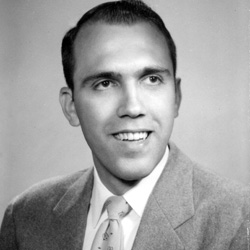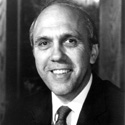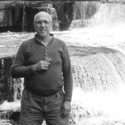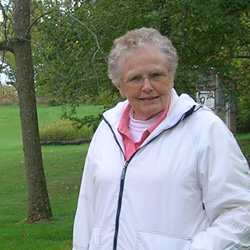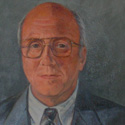David Weikart
Before David Weikart began the Perry Preschool Study, he did a tour of duty with the U.S. Marines in Japan and Korea. It was the mid-1950s, he had just graduated from Oberlin College, and military culture was a bit of a shock to him.
"[There were] a number of instances in the Corps that were really funny," he said in an interview with a colleague the summer before he died. "We were doing a bayonet drill called the 'Spirit of the Bayonet.' And there was a chap in the Corps that felt about the same way I did about things and we were paired up for this bayonet drill. And while the other guys were all yelling 'kill' and various vulgarities, we were yelling, 'Peace! Fortitude! Happiness!'
That anecdote seems to sum up David Weikart pretty well. He died of cancer in 2003 and I never met him. But I learned a lot from talking to people who knew him, reading his memoir, and watching this video interview a colleague did with him just a few months before he died.
Video courtesy of HighScope
In the video, Weikart is sitting on bench under a tree at the summer camp he founded with his wife and two friends back in 1963. Throughout the interview you can hear campers' voices in the background, their chatter and cheerful yells, a dinner bell calling them to the mess hall.
Camping, hiking, being outdoors - these things had always been a big part of Weikart's life. And during all the years he worked as a school administrator and education researcher, he also ran this camp for teenagers each summer.
"We sought out families with youngsters who could benefit from the experience but who could not afford to pay," he writes in his memoir. It was an interracial camp, still a new notion in 1963.
Weikart was a bit of a radical, a free-thinker, a man ahead of his time. He was already established in his career and the father of four young daughters by the time the civil rights movement really got going in the 1960s. So he made his mark on the world not by marching in the streets but by challenging convention from inside institutions - first the Marines, and then the public schools.
"We could do nothing about the war in Vietnam," he wrote in his memoir, "but we could change education for poor children."
Weikart grew up in Youngstown, Ohio during the Depression. His parents were community social workers; they directed settlement houses and summer camps. Money was tight. That's why he signed up for the Marines - so he could save for graduate school. And it was an experience in the Marines that first got him thinking about education.
"Marine Corps training was an officer or a sergeant who stood up in front of the group," he said in the interview before he died. "[They] read from a manual, showed a few dirty pictures on a slide, a couple of graphs or something, and then you were dismissed."
Weikart thought it was boring and ineffective. So when a fellow officer asked him to lead some training on weapons systems, he decided to try a different approach.
"I called the heavy weapons commander and said what I'd like to do is display [the] weapons, one of each, and then have my troops come over and talk with [his] troops, who manned each of these different weapons systems."
There would be no lecture, no manual to memorize. He thought the troops would learn more if they could "see all the systems, get in the vehicles, pull the cords, just have a hands-on experience, some respect for the weapon."
Weikart says the training was almost finished, it was going well, and he turned around to find the division commander standing there. "The captain in charge of our company had gone to get him to see what an unusual training this was."
Weikart traces his ideas about education back to this moment. "If you want to look for origins of my educational philosophy, that was when I realized that if you could just somehow engage [people] in things, they would both learn more and be more enthusiastic."
He brought that educational philosophy to the Perry Preschool.
Weikart started the preschool in response to frustration with what he describes in his memoir as "the pace of needed changes in a small, local school system." It was 1958. He was, in his own words, "young, idealistic, and impatient to make things happen." And he had a new job as director of special education for the public schools in Ypsilanti, Michigan.
Weikart knew almost nothing about early childhood development. His Ph.D. was in education and psychology, and he was mainly interested in adolescents. Most of what he knew about child development he learned in a course at Oberlin ten years earlier. But he quickly became interested in early education when Ypsilanti school officials balked at his ideas for reform in the upper grades. He came up with the idea of a "pre" school because officials wouldn't let him change the schools.
At the time, there was no such thing as preschool. There were nursery schools, but they were mainly for middle- and upper-class children, families who could afford tuition.
"Almost every university had its own laboratory school," he recalls. "Their programs included large blocks of unstructured play and a focus on self-sufficiency skills such as training in toileting, hand-washing, coat-buttoning, and shoe-tying… [T]erms such as 'cognitive,' 'problem-solving,' or 'academic preparation' were not mentioned by most of these program teachers." It was all social relations and psychological adjustment. These were the "in" ideas among early childhood education experts.
But Weikart wanted to start a real school for 3- and 4-year-olds. This was a radical idea. Most people thought children weren't ready for school until they were 6. They couldn't sit still long enough for one thing. School was a place where children went to be taught; picture students sitting in rows, listening quietly to lessons and lectures. It was kind of like the Marines. And Weikart hated that. It was boring, ineffective.
He was imagining a new kind of school, one where children learned through hands-on activities, doing things for themselves. He writes in his memoir that he wanted to create a school that "fundamentally changes the teacher's role from one of directing groups of children and their learning by providing uniform lessons to one of observing the individual child's self-planned work, engaging in conversation about the progress of the work [and] expanding language [and vocabulary]."
Weikart traces his idea for a preschool back to a meeting with school principals in the fall of 1958. He'd been on the job as director of special education for just a few months and what he'd already noticed was how badly a lot of African American students were doing in school. They were repeating grades, being assigned to special education, dropping out. He wanted to do something to help them. He drew up graphs and charts comparing the performance of students at the all-black Perry School (elementary schools were still segregated in Ypsilanti in 1958) to the performance of students at an all-white school across town. And the differences were stunning.
"Over the previous 10 years of standardized achievement testing (1948-1957), no class in the predominantly African American school ever exceeded the 10th percentile on national norms for any tested subject," he writes in his memoir. "Yet in the elementary school across town, which primarily served the children of white, middle-class university professionals, no class ever scored less than the 90th percentile."
To Weikart's mind, there was something wrong with the schools if one group of children was failing, while another group was doing fine. But the principals didn't see it that way. They said there was nothing wrong with the schools. It was the children. They weren't intelligent enough, they weren't capable of doing well.
"The very limited discussion ended with the announcement that everything possible was already being done; the test scores just represented the way children were," Weikart writes. "What could you expect? Their ability is what they were born with."
People didn't talk about "achievement gaps" back then the way we do today. And most people believed deeply in the idea of IQ - intelligence quotient. Everyone was born with a certain amount of intelligence. Some people were smart, other people were not, and that was that. Schools couldn't do anything about it.
"I was working in a context where most people felt that IQ was God-given, and unfortunately, low-IQ minority children were just born that way," writes Weikart in his memoir.
But some people were beginning to question this idea, including Weikart. He recalls learning about studies of cage-reared versus playground-reared rats in zoology courses he took during graduate school.
"These studies strongly suggested that problems caused by limited environments could be ameliorated by stimulus-rich opportunities," he wrote. "For me, the idea of enriched opportunities for poor children from limited backgrounds seemed justified by the findings from these ... studies."
At the time, Ypsilanti was still a segregated city; African Americans lived in one poor neighborhood on the south side. At the center of the neighborhood was the Perry School. Weikart approached the principal about his idea for a preschool. Eugene Beatty was enthusiastic. School district officials were not. So Weikart embarked on a campaign to convince them that preschool was worth a shot.
When he turned to the literature on early childhood education he was disappointed to find that almost all of the research focused on higher-income children.
"Early childhood education, especially for disadvantaged children, really was a new world," he writes.
He convened a series of meetings with university professors in child development and special education. "The basic advice from several of these experts was not to operate [a preschool program]," Weikart writes. "They felt that 3- and 4- year-olds, especially from disadvantaged backgrounds, would be unable to handle any program that I might plan to offer, and that in fact the program might actually harm the children."
Weikart was startled by their advice. So rather than push school officials for permission to set up a preschool, he proposed an experiment instead, a scientific experiment with a study group and a control group - the kind of experiment the FDA requires for new drugs. Weikart thought the university professors had asked but not answered a legitimate question: "Does participation by disadvantaged children in an early education program improve their intellectual and academic abilities?" Or, simply put, he writes: "Does preschool work?"
And that's how the Perry Preschool study began. Nearly 50 years later, it's still going. Researchers are making plans to collect data and do interviews again now that study participants are in their 50s. Before he died, Weikart said he hoped the study would continue.
"I think he was always experimenting. That was his life," says Weikart's widow, Phyllis Weikart.
We're sitting in the living room of the house she and her husband built at their summer camp. It's in Clinton, Michigan, a rural area outside of Ypsilanti. Just a few hundred yards from the front door is a small garden where David Weikart's ashes are buried. Phyllis Weikart says her husband wanted his ashes scattered from an airplane over this property, but she couldn't do it. She needed his remains in a place she could visit.
"Everybody says there are very few individuals like Dave, with the vision he had," says Phyllis. "But he wasn't the kind of individual to talk about his own accomplishments."
Dave Weikart was not imagining an extensive longitudinal study when the Perry Preschool began in 1962.
"I don't believe any researcher wakes up one morning and says, 'Today I'll begin that 40-year study I've been thinking about!'" he writes. "Instead, such efforts usually emerge from a gradual accretion of ideas considered and embraced, one experience at a time - at least that's the way it was for me."
Weikart lived long enough to see his study have a huge impact. Preschool is now a widely accepted idea, and there is lots of evidence to prove that it's effective. But the massive expansion of preschool programs in public schools has quickened in the years since Weikart's death in 2003. The enthusiasm for preschool among policymakers stems in large part from support by economists and businesspeople, and their interest is due in large part to the extraordinary results of Perry.
Weikart's widow Phyllis says her husband would be pleased to see how widespread preschool has become. "I think he just wanted opportunities for young children, no matter who they were," she says.
But David Weikart did have some concerns about the direction of preschool education.
"I think our field is full of ideas and fads based on personal beliefs rather than solid research," he wrote in his memoir, published in 2004. "A number of educational programs are in use today, which, when scientifically evaluated, are shown not to be effective. Many more are offered only after a limited evaluation and without the necessary information on the program's overall impact on the children."
Weikart was concerned about the direction of education policy. "The political force ... is to push for [a] direct-instruction style of teaching because of the concern for 'basics,'" he wrote. To him public education was looking more and more like what he hated in the Marines. He thought a sit-down-in-your-seats and memorize-the-manual mentality was taking over, and he worried preschool would become like that.
"The question is not whether a child knows something (the alphabet, for example), but what were the conditions under which it was learned," he wrote.
His central belief was that education should be hands-on, engaging, fun. The point was to help children become enthusiastic about learning, not just proficient with facts and information. He saw education as a process, not an end result. And he believed the Perry Preschool proved that this kind of educational approach was effective.
"I mean, clearly, the direct-instruction system teaches what they purport to teach," he said in the interview before he died. "The problem is that when kids get older, they don't have the other skills that are necessary, like decision-making; a sense of personal responsibility; a sense of personal initiative." And that, he said, "is a fatal flaw."
Back to Early Lessons.


